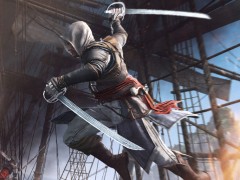Video Gamer is reader-supported. When you buy through links on our site, we may earn an affiliate commission. Prices subject to change. Learn more
Assassin’s Creed is big business, so everything around it has to be big. Big reveal, big hype, big venue – the Merchant Taylors’ Hall in London, which is three times posher than Buckingham Palace and just as twatty. Big attendance: everyone from the UK video games industry was there. As a fellow journo put it, if a bomb had gone off there and then the British games SEO industry would have been crippled for some time.
The series is over the top as standard. And any time that’s a default position, things are either brilliant or laughable. Assassin’s Creed is both, and so was its reveal.
Underneath all of the showy producer chestbeating and forced theatricality however, the announcement – and as such the event – made Assassin’s Creed 4 feel like an apology for 3. Not that Ubisoft would admit it, or perhaps even acknowledge it themselves – the blinkers are on, the deadline is tight, and there are features to be creeped. And maybe that’s the problem: the series is so big, propelled by its mass into a shareholder-pleasing yearly rotation, that it is essentially competing against itself. Every year we hear that this is the best Assassin’s Creed ever, that this will redefine or revolutionise, and yet it’s hard to not think ‘Yeah, but what about the next one?’
Revelations had this feeling in spades, but then so did Assassin’s Creed 3, the supposed big bad, the Assassin’s Creed game. Remember when that had more hype than a rap music video from the late nineties? That was about six months ago.
That’s done and dusted now, though, and we’re on to the next one. As an isolated instance this isn’t too bad. It’s plain to see that Ubi miscalculated with the third numbered instalment: what was no doubt planned as the first of an American trilogy destined to be described as ‘sweeping’ by everyone, died the second Haytham exited stage left. Connor was unlikeable, the combat wasn’t satisfying, and the game was even more fiddly, overlong and logically unsound than previous entries. And that’s before we get to the aliens. Or the fact that it spoiled the twist in one of the character bios.
But hey, it doesn’t matter, because as ever there’s another Assassin’s Creed coming, and this one is going to be really good, promise. In fairness, it looks interesting. Black Flag is a greatest hits package of sorts that swiftly jettisons charisma vacuum Connor for his great-grandaddy, Edward Kenway. The action is centred around Nassau, with Cuba being the main attraction and other islands dotted around to explore. There is naval combat and jungle exploration, as well as deep sea diving. Kingston and Havana feature, and Ubisoft seems to be basing these locations around earlier cities in the series.
Looked at one way, this could be interpreted as the purest expression of what the series has become. The feature creep of previous games has seen mechanics shoehorned in over others that don’t necessarily gel; a series of elements laid on top of each other for the purposes of crowing from the back of the box. Why not just extrapolate that to its natural conclusion and make it Assassin’s Creed: Megazord edition? This isn’t a new Ass Creed game, it’s every Ass Creed game.
A worrying thought: if Ubisoft couldn’t get one environment right last time, how is it going to get four, not counting the other areas?
Another explanation could just as easily be, however, that Ubisoft has figured out what works and what doesn’t, and is attempting to mix the best elements of the series together. That contstant iteration has shown them the way. Ubisoft’s check list of games to pull from essentially starts and ends with Assassin’s Creed 2, by its own admission.
This is A Good Thing. The original Assassin’s Creed was too simplistic, and everything after Brotherhood was self-indulgent, box-ticking noise. Assassin’s Creed 2 and Brotherhood, on the other hand, nailed the balance between mechanics and narrative. If Ubi Montreal can take that as a base and recreate that feeling of operating in a coherent world, then we’re very excited indeed. Black Flag’s setting and environments promise much, and we hope they deliver. Either way, we should be in for a far more enjoyable experience than trudging around the American wilderness as a humourless Connor.
Concerns, however, still linger. The Assassin’s Creed series is a never-ending relay race of ideas being passed between teams and projects, studios overtaking each other, and sometimes that baton gets dropped, as it did with AC3. Black Flag looks promising, but can it scale the heights of AC2 or Brotherhood? We hope so. No worries if not though: there’ll be another one along in a minute.

/https://oimg.videogamer.com/images/478e/assassins_creed_4_black_flag_2.jpg)
/https://oimg.videogamer.com/images/65d8/assassins_creed_4_black_flag_5.jpg)